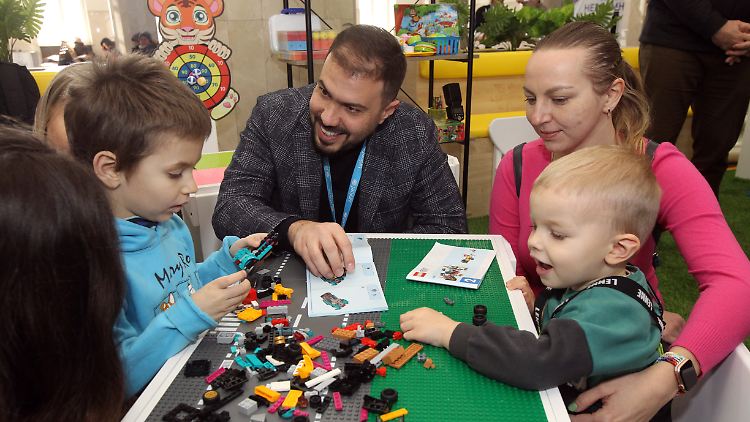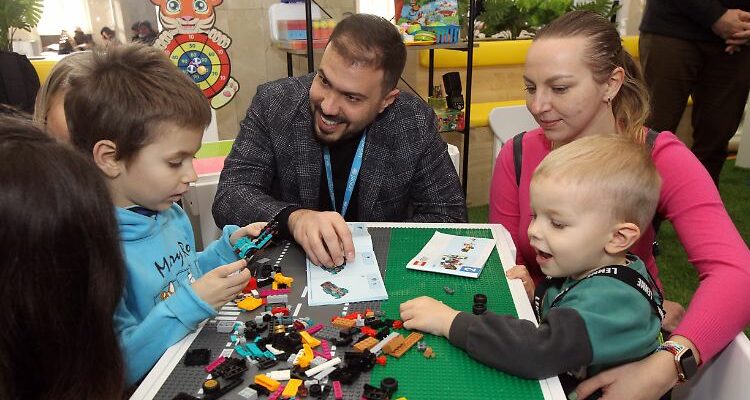Perspectives in the air raid shelter
Ukrainian children spend thousands of hours underground
By Lukas Wessling
February 23, 2024, 5:35 p.m
Since the start of the war, Ukrainian children have spent thousands of hours in shelters. Some spend up to seven months underground. Especially in such situations, young people need perspectives, says UNICEF boss Schneider. 16-year-old Mariia agrees with him.
Anyone who sleeps around seven hours a night has spent around 5,000 hours in bed in the past two years. The children’s aid organization UNICEF has calculated that some Ukrainian children and young people had to endure exactly that long in air raid shelters during the same period because of the Russian attacks. The children play, learn and sleep underground because shells and bombs threaten to fall above them.
A large part of the lives of young people in Ukraine currently takes place in shelters, bunkers and subway stations, especially near the front. According to UNICEF, they have been stuck underground for 3,000 to 5,000 hours since Russia’s raid, the equivalent of four to seven months.
One of these young people is Mariia from Kryvyi Rih. On the sidelines of a press conference, she talks about the start of the war: She went back to school normally for two days, the pandemic-related distance learning had just ended, then the Russian army attacked. Mariia was once again banished to isolation. Only this time bombs also fell.
A circle of friends scattered across Europe
One day she was hanging out with friends, smoking and talking about the upcoming math test. The next day, sirens sounded, rockets hit all over Ukraine, and people fled to air raid shelters. She didn’t have to write the math test, says Mariia and laughs secretly.
In the following months she had to experience how her entire circle of friends gradually fled Kryvyi Rih. The people to whom young people in particular orient themselves so strongly, from whom they seek confirmation, with whom they have so many experiences – they are now spread across Europe.
Mariia seems to be less stressed by the physical absence. She is pragmatic: It is now quite easy to keep in touch. Nevertheless, the situation often made her sad at first, she says, brushing one of her brown curls aside: the conversations with her friends suddenly revolved around topics that Mariia no longer had access to. They talked about how difficult it is to learn Spanish, how different the Slovenian school system is, and what the food tastes like in Germany. Mariia says she felt like a lot was happening in other people’s lives while she was stuck in Ukraine, where the streets were becoming increasingly deserted.
“Ukraine needs more than just weapons”
But Mariia also talks about new friendships she has made. As part of the UNICEF “Upshift” program, she was able to start her own project and help her peers cope with the psychological stress that war brings. “I would never have met the people I got to know without the war,” she says.

In the so-called Spilno centers, children can play – and receive psychological care.
(Photo: picture alliance / Photoshot)
The “Upshift” program reaches more than 10,000 young people in Ukraine, says German UNICEF boss Christian Schneider. “UpShift” allows them to realize their own projects even in contested cities. The young people would receive training, for example in project management, and a small amount of start-up funding. “That helps the community, but also the young people,” says Schneider. For many, it is an important experience to see “what they can bring to the streets.”
“For Ukraine to remain strong, it needs more than just weapons,” says Federal Development Minister Svenja Schulze. Your ministry has therefore provided UNICEF with 130 million euros since the outbreak of war in Ukraine. Schulze argues that by helping children and young people, Germany is strengthening Ukraine’s resilience and making the country ready for the time after the war: “Because it is this generation that, after school and training, will rebuild Ukraine as a free, European country .” The Ukrainians could also rely on Germany’s support here, as long as it was necessary.
Missile alarm is “completely normal” for Ukrainian children
Schulze talks about a visit to one of UNICEF’s so-called Spilno centers: A kind of playground was set up in a former shopping street. Children, parents and carers would have peacefully enjoyed a piece of everyday life there. Schulze remembers that a concept with psychological counseling had been announced to her, which is why she was looking for specialist staff.
But the care took place in front of her eyes, without a prescription and a white coat. In a low-threshold and, to a certain extent, incidental manner, the employees in the Spilno centers build trust and, if necessary, organize further offers.
They seem to be urgently needed. When asked whether some children would not defend themselves against the repeated descent into the air raid shelters, Mariia can only smile wearily: “It’s completely normal for the children in Ukraine,” she says. We have been at war for ten years, and for ten years there have been exercises in which children learned to deal with alarm signals. “I can still remember having exercises like this in elementary school,” says the 16-year-old. Children just got used to everything. She also sometimes has to realize that there was a time before the war.
